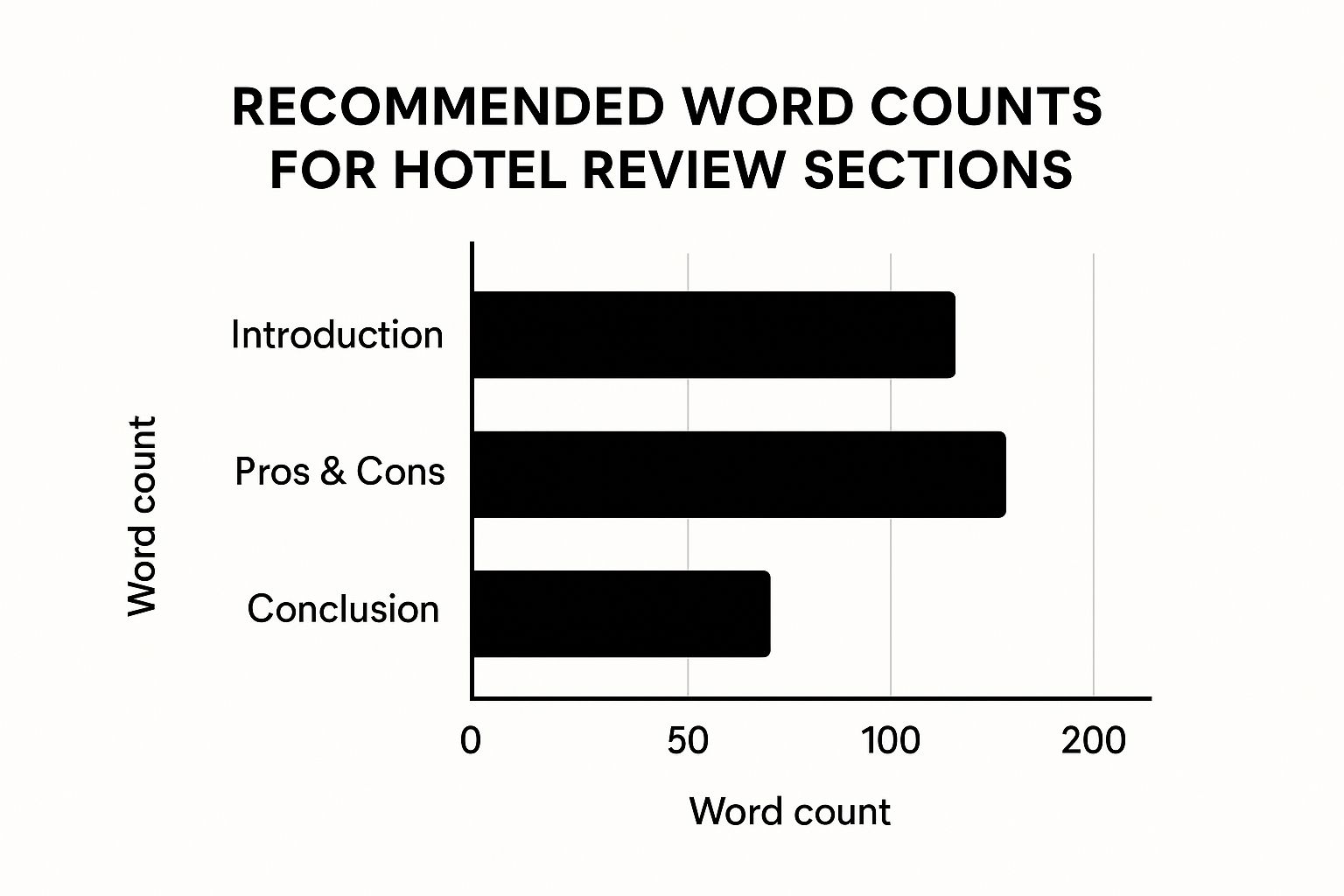Mastering Hotel Review Writing to Boost Bookings
July 14, 2025

Your online reputation is built one interaction at a time, and a thoughtful approach to responding to reviews is the bedrock of that foundation. It's about more than just replying; it's about crafting responses that address guest feedback while also serving as powerful marketing messages for anyone considering a stay with you.
Why Your Review Responses Matter More Than Ever

Hotel reviews have evolved. They’re no longer a one-way street where guests just drop off their opinions. Now, they're a dynamic, very public conversation between you and your potential customers. Every single reply you post is a direct reflection of your brand's commitment to service, influencing booking decisions in real time.
Gone are the days when you could just let reviews pile up. Today's travelers are savvy—they actively look for management's responses to understand how a hotel handles both praise and criticism. Your engagement shows you're attentive, professional, and genuinely invested in the guest experience. That active participation builds a layer of trust that star ratings alone simply can't.
The Impact of Active Engagement
When a potential guest sees you consistently and thoughtfully engaging with past visitors, it sends a powerful signal. It tells them you value feedback and are always striving to improve. This public display of customer service can easily be the deciding factor when someone is choosing between your property and a competitor down the street.
A recent Guest Experience Benchmark Report, which analyzed over 39 million reviews, drives this point home. It found that the quality and speed of review responses are now critical factors in guest satisfaction and loyalty. Customers don't just hope for a response; they expect it.
This interaction is also your chance to frame the narrative. A glowing review becomes an even stronger testimonial when you add a personal thank you. And a well-crafted response to a negative review? That demonstrates accountability, grace, and your commitment to making things right.
Core Pillars of Effective Hotel Review Responses
To build a strong reputation, your responses should be guided by a few core principles. Think of these as the foundation for every reply you write.
Following these pillars consistently helps turn simple replies into reputation-building assets.
Building Your Reputation Proactively
Mastering hotel review responses is a fundamental part of modern reputation management. It's not just about saying "thank you" or "we're sorry." It's about using each response as a chance to reinforce your brand's unique voice and values.
By treating every review as a conversation, you transform passive feedback into an active asset. You're not just resolving an issue for one person; you're building credibility with thousands of potential guests who are watching how you handle it.
To get a fuller picture of the entire feedback ecosystem, it's worth exploring resources focused on mastering how to manage online reviews. Ultimately, a proactive strategy is what turns past guests into your most passionate advocates.
Turn Positive Reviews into Marketing Wins

A glowing review is more than just a nice compliment; it's a golden marketing opportunity. When a happy guest takes the time to share their experience, a generic "thank you" just doesn't cut it. You're not just replying to one person—you're speaking to every single potential guest who's reading those reviews to make their booking decision.
This is your chance to turn their positive words into a powerful story about your hotel. The trick is to stop thinking in templates and start crafting personalized responses that highlight exactly what makes your property stand out. By pulling out specific details from their review, you show you're actually listening, and you subtly advertise your best features.
Personalize with Specifics
Ditch the cookie-cutter replies. Phrases like "Thanks for your kind words" are forgettable and feel automated. Instead, dive into the review and pull out a specific detail they mentioned. This proves a real person is on the other side of the screen and makes your response far more compelling for future bookers.
Let's look at how this plays out:
Instead of: "We're glad you enjoyed your stay."
Try this: "We're so thrilled you loved the sunset view from your balcony! It's one of our favorite things about the property, too."
Instead of: "Thank you for the compliment about our staff."
Try this: "Maria will be so happy to hear her restaurant recommendations made your anniversary dinner special. We'll be sure to pass along your praise."
See the difference? That simple change transforms a bland reply into a mini-advertisement for your incredible views and five-star team members.
Extend a Personal Invitation
A great response shouldn't feel like the end of the conversation. It's about building a relationship that encourages loyalty and repeat business. Make your guests feel like they're part of your hotel's family, not just another reservation number.
A great response doesn't just close a loop with a past guest; it opens the door for a future one. It should make the reviewer feel appreciated and make a prospective guest feel excited about the experience you offer.
A warm, personal invitation is a perfect way to do this. Something as simple as, "We'd love to welcome you back next time you're in the city. Please feel free to reach out to us directly, and we’ll make sure your next stay is just as memorable," makes your hospitality feel genuine and ongoing.
Don't let these interactions just sit on the review site, either. These positive exchanges are pure content gold. With a few smart content repurposing strategies, you can turn snippets from rave reviews into testimonials for your website, engaging social media posts, and even highlights in your email newsletters.
For a deeper dive into this, check out our guide on how to improve hotel reviews through strategic engagement. And if you want a hand in building a system to manage all of this, let's talk—you can book a free consultation with me on Calendly.
Handle Negative Reviews with Grace and Strategy

Let's be honest—no one likes getting a bad review. It can sting, feeling like a personal jab at all the hard work you and your team put in. But here’s something I’ve learned over the years: your response to that criticism is one of the most powerful tools you have. It can turn a public complaint into a showcase of your hotel's character and commitment.
Your real goal isn’t to win an argument online. It's to show everyone—especially future guests—how you handle things when they don't go perfectly. A well-crafted, thoughtful response demonstrates that you listen, you care, and you’re dedicated to making things right. This isn’t just damage control; it’s reputation-building at its finest.
A Framework for a Cool-Headed Response
When a negative review pops up, you need a plan. Acting quickly and professionally is key to keeping a bad situation from getting worse. I’ve always found a simple three-part approach works best. Think of it as Acknowledge, Resolve, and Transition.
This method keeps you focused and prevents you from getting defensive.
- Acknowledge Promptly: A fast reply is non-negotiable. It proves you're paying attention and value what your guests have to say.
- Resolve with Empathy: Start with a sincere apology for their subpar experience. Show you've actually read their complaint by mentioning the specific issues they faced. This validates their feelings.
- Transition Offline: Always offer a direct line—an email or a phone number—to discuss the specifics privately. This moves the sensitive details out of the public forum.
Choosing Your Words Carefully
The language you use can either pour fuel on the fire or put it out. Your tone should always be apologetic and helpful, never confrontational. The right phrasing can completely change the dynamic.
For instance, resist the urge to jump in with a defensive line like, "Our records show..." It just makes you look argumentative.
Instead, try a more validating approach:
"Thank you for bringing this to our attention. We are very sorry to hear that your experience with our room service did not meet expectations. Providing timely and high-quality service is a priority, and it is clear we fell short during your stay."
See the difference? This response immediately puts you on the guest's side. It validates their frustration without necessarily admitting to a systemic failure before you've had a chance to investigate.
If you're looking for more inspiration on how to phrase things just right, you can find some excellent negative review response examples to guide you through different tricky scenarios.
Why Bother? The Strategic Payoff
Mastering the art of the negative review response has a real, tangible impact on your business. Research consistently shows that a hotel's ability to manage its online reputation is a massive competitive advantage, especially as occupancy and daily rates fluctuate.
Every response you post isn't just for the person who wrote the review; it's a message to every potential guest who reads it. You're telling them that even if a mistake happens, your hotel has the integrity and professionalism to handle it. That kind of reassurance can be far more persuasive than a perfect, unbroken string of five-star reviews.
Weave SEO into Your Review Responses Naturally
Think of every single review response you write. It's not just a quick "thank you" or an apology; it's a public-facing piece of content. And like all content online, search engines like Google are reading and indexing it to figure out what your hotel is all about. This makes your replies a surprisingly potent, and often overlooked, tool for your hotel's SEO.
The trick is to be strategic without sounding robotic. You want to naturally echo the kinds of terms and phrases that potential guests are typing into Google when they're looking for a place to stay. When you do this, you’re sending strong signals to search engines that your property is a fantastic match for those travelers. It’s a subtle art, but one that can pay off in a big way.
This breakdown shows the ideal length for different parts of a guest's review, giving you a clue as to where you'll find the richest details to work with.

As you can see, the "Pros & Cons" section is where guests get specific. This is your goldmine for keywords and details you can mirror back in your response.
Identify Your Core Keywords
First things first: you can't use your keywords if you don't know what they are. This isn't about guessing generic terms. It’s about drilling down into the specific phrases that highlight your unique location, amenities, and guest experience. What makes your hotel stand out? What would you search for if you were a guest?
Your most powerful keywords will likely fall into these buckets:
- Location-Based: Think like a traveler. They're searching for a "hotel near the convention center," a "boutique hotel in the arts district," or an "oceanfront hotel with beach access."
- Amenity-Based: These are your selling points. Keywords like "pet-friendly hotel," "hotel with indoor pool," "free breakfast and parking," or "rooms with jacuzzis" are what seal the deal for many guests.
- Experience-Based: Who are you for? A "romantic getaway hotel," a "family-friendly resort," or the perfect "hotel for business travelers."
Get this list down. It’s your new playbook for responding to reviews.
Expert Tip: The point isn't to cram keywords into every sentence. It's about naturally confirming what makes your hotel great. You're having a conversation that helps both future guests and search engine bots understand your value.
Put SEO into Practice
Let's move from theory to reality. This is where you transform a standard, forgettable reply into one that actively works to bring you more bookings.
Real-World Scenario 1: The Business Traveler
- Guest Review: "Perfect stay for my conference. The location was super convenient, and the fast Wi-Fi was a lifesaver."
- A Good, But Better, Reply: "We're delighted our hotel near the convention center was perfect for your trip! We know how important reliable, high-speed Wi-Fi is for our business travelers, and we're glad it helped you stay productive. We hope to welcome you back for your next work event."
Real-World Scenario 2: The Family Vacation
- Guest Review: "The kids had a blast in the pool, and we loved being so close to the theme park. A great family trip!"
- A Good, But Better, Reply: "Thank you for choosing us for your family vacation! It's wonderful to hear the kids enjoyed our family-friendly hotel with an indoor pool. Being just a short drive from the theme park is a big plus for our guests, and we’re so glad it made your trip special."
Finding the sweet spot between authentic guest engagement and smart SEO is crucial. It’s a practice that requires a light touch. To help you master this, here’s a quick reference guide.
SEO Do's and Don'ts for Review Responses
This table breaks down how to apply SEO principles to your replies without sounding like you're writing for a robot.
By weaving these simple SEO tactics into your replies, you turn every review into a small marketing asset. Each one reinforces why a guest should choose you, helping you stand out in a crowded search results page.
If you want to dive deeper and build a rock-solid SEO strategy for your guest communications, let's talk. You can book a complimentary 30-minute consultation on my Calendly and we can get started.
Use Review Insights to Drive Real Improvements
Your review responses are more than just public relations—they're the final step in a powerful feedback loop. The reviews themselves are a goldmine of operational intelligence. Think of it as a direct, unfiltered feed from your customers telling you exactly what’s working and what needs attention. When you start systematically analyzing customer feedback, you stop simply reacting to problems and start proactively improving your entire operation.
This isn't about getting bogged down by every single comment. It's about seeing the bigger picture. One guest complaining about slow Wi-Fi could just be a fluke. But if you see 10 similar complaints pop up in a month? That’s no longer an anecdote; it's a clear signal that your network infrastructure needs a serious look. This feedback loop is your secret weapon for making smarter, data-backed business decisions.
Turning Words into Actionable Tasks
So, how do you get started? The first step is to bring some order to the chaos. You need to categorize the feedback you're getting, almost like sorting mail into different bins. This allows you to quantify what people are really talking about.
Create buckets for the common themes you see, both good and bad. They usually fall into predictable categories:
- Cleanliness: Comments on the state of guest rooms, bathrooms, and common areas.
- Staff Performance: Mentions of specific employees who went above and beyond, or critiques of service.
- Amenities: Feedback on the pool, gym, Wi-Fi, in-room tech, or breakfast offerings.
- Room Condition: Notes on things like outdated furniture, a leaky faucet, or noise from the hallway.
Once you start sorting comments this way, patterns will jump out at you. You might find that while your overall service scores are good, your front desk team is consistently singled out for excellence. That's a huge insight! You can take what makes them great and build it into your training for every single department.
From Insights to Investments
These trends do more than just fine-tune your training programs. They give you the hard data you need to justify real-world investments. Let's say you're getting rave reviews about the newly renovated lobby bar, but a steady stream of complaints about the worn-out gym equipment. Suddenly, you have a rock-solid business case for where to allocate your next round of capital.
Think of your reviews as a roadmap built by your guests. Following it doesn't just improve their experience; it directly impacts your bottom line by helping you invest in what truly matters to them.
This process transforms how you see guest feedback. Responding to reviews is no longer a chore on a checklist; it becomes a core part of your business strategy. You’re not just typing out replies—you’re listening, learning, and evolving. To see how these insights can be woven directly into your replies, check out our collection of hotel review response examples.
Answering Your Toughest Questions About Hotel Reviews
Even with a solid plan, you're bound to run into tricky situations when managing online reviews. It happens to everyone. Knowing how to handle these common curveballs with confidence is what separates good reputation management from great. Let's break down some of the questions I hear most often from hoteliers.
How Fast Is Fast Enough When Replying to a Review?
Speed matters. A lot. For any positive or even neutral review, you really want to get a response up within 24-48 hours. It sends a clear message that you're paying attention and you value guest feedback.
Now, when a negative review hits, that clock speeds up. I always advise responding in under 24 hours. Getting back to a critical comment that quickly does two things: it shows the unhappy guest you’re taking them seriously, and it proves to everyone else looking at your page that you’re proactive and dedicated to fixing problems. It’s one of the strongest signals you can send about your commitment to guest satisfaction.
Can I Use AI to Help Write Review Responses?
Absolutely, but with a big caveat. Think of AI as your co-pilot, not the pilot. It's a fantastic tool for getting a first draft on the page, checking your grammar, or just helping you get past that initial "what do I say?" moment. The real work, the part that connects with people, has to come from you.
An AI-generated response is a tool, not a final product. Use it to work faster, but never let it replace your genuine, human voice. A cold, robotic reply can do more damage than no reply at all.
Your job is to take what the AI gives you and inject real personality and specifics into it. Did the guest rave about the view from room 402? Did they mention how much they loved the signature cocktail from the bar? Weave those exact details into your reply. That’s what makes a response feel authentic and proves you actually read and absorbed their comments.
What’s the Best Way to Handle a Fake Review?
First thing's first: don't let emotion drive your response. Your public reply is your most powerful tool here, so you need to be professional and level-headed. The goal isn't to start a fight, but to calmly set the record straight for anyone else reading.
Imagine a review falsely claims your pool was closed. A great response would be something like:
"Thank you for sharing your experience. We do want to clarify for any future guests that our indoor pool, located on the second floor, was open daily from 8 AM to 10 PM during the dates of your stay. We're sorry if there was any confusion, and we hope you'll have the chance to enjoy a swim on your next visit."
See how that works? It corrects the false information for future readers without sounding accusatory. Once you've posted your public reply, you should then report the review to the platform (like Google or TripAdvisor) if you believe it violates their content policies. But your calm, public response is your first line of defense.
Is It Ever Worth Responding to Old Reviews?
Generally, you want to keep your focus on new reviews as they come in. That's where your energy has the most impact.
However, if you're just kicking off a new, proactive approach to review management, it can be a smart move to go back and address a handful of key reviews from the last 2-3 months. This makes your new commitment to guest engagement immediately visible. Choose a few glowing positive reviews and one or two constructive negative ones to show you're now listening across the board. Just avoid digging up anything older than six months—it tends to look a bit strange and loses its relevance.
At Ranova, we see every piece of feedback as a chance to connect and improve. Our platform is built to help you manage reviews without the headache, turning guest insights into real-world improvements that build an incredible online reputation.
Curious to see how our AI-powered tools can support your hotel's review strategy? Let’s find 30 minutes to chat. You can book a personalized demo directly on my Calendly.
Start now and turn guest feedback into
unmatched
experiences
.png)
.svg)
.svg)

